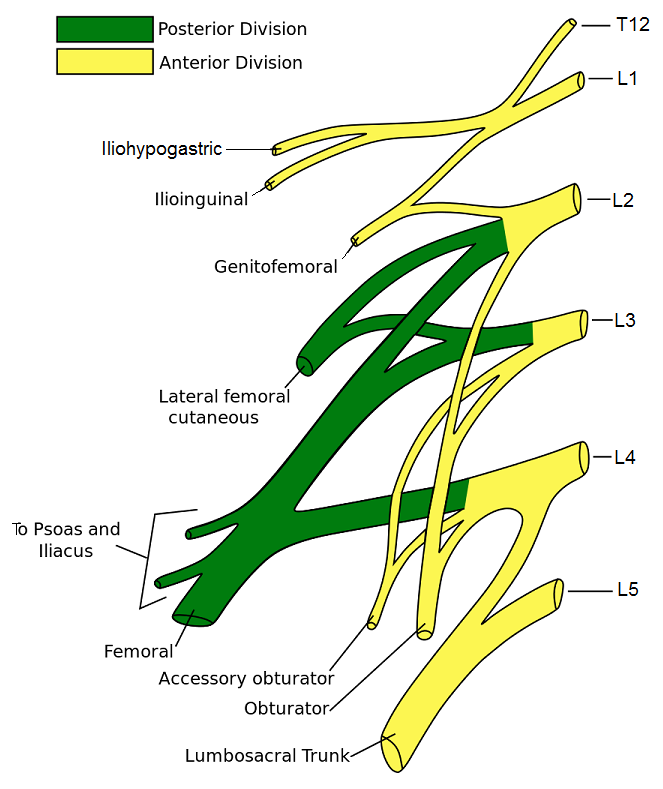
Anatomy
Abdomen
The lateral femoral cutaneous nerve innervates which of the following:
Answer:
The lateral cutaneous nerve of the thigh (lateral femoral cutaneous nerve) is formed from the anterior rami of L2 and L3. It supplies skin on the anterior and lateral thigh to the knee.Lumbar Plexus
Anatomy / Abdomen / Posterior Abdominal Wall
Last Updated: 16th December 2019
The lumbar plexus is formed by the anterior rami of nerves L1 - L3 and most of the anterior ramus of L4. It also receives a contribution from the T12 (subcostal) nerve. The lumbar plexus forms within the substance of the psoas major muscle, anterior to its attachment to the transverse processes of the lumbar vertebrae.

Lumbar Plexus. (Image modified by FRCEM Success. Original by Ninovolador (talk) derivative work: Mcstrother (Gray822_es.svg) [CC BY 3.0 , via Wikimedia Commons)
Function of the Lumbar Nerves
Table: Function of the Lumbar Nerves
| Nerve | Spinal Segment | Motor Function | Sensory Function |
|---|---|---|---|
| Iliohypogastric nerve | L1 | Internal oblique and transversus abdominis | Posterolateral gluteal skin and skin in pubic region |
| Ilioinguinal nerve | L1 | Internal oblique and transversus abdominis | Skin in upper medial thigh, and either skin over root of penis and anterior scrotum or mons pubis and labium majus |
| Genitofemoral nerve | L1, L2 | Male cremasteric muscle | Skin of anterior scrotum or skin of mons pubis and labium majus (genital branch), skin of upper anterior thigh (genitofemoral nerve) |
| Lateral cutaneous nerve of thigh | L2, L3 | N/A | Skin on lateral thigh to knee |
| Obturator nerve | L2 – L4 | Obturator externus, gracilis and adductor muscles | Skin on medial aspect of thigh |
| Femoral nerve | L2 – L4 | Iliacus, pectineus, sartorius and quadriceps femoris | Skin on anterior thigh and medial leg |
The iliohypogastric nerve is formed from the anterior rami of L1. It innervates the internal oblique and the transversus abdominis and supplies posterolateral gluteal skin and skin over the pubic region.
The ilioinguinal nerve is formed from the anterior rami of L1. It innervates the internal oblique and transversus abdominis and supplies skin over the upper medial thigh and the external genitalia.
The genitofemoral nerve is formed from the anterior rami of L1 and L2. Its genital branch innervates the male cremaster muscle and supplies skin over the external genitalia and its femoral branch supplies skin of the upper anterior thigh.
The lateral cutaneous nerve of the thigh (lateral femoral cutaneous nerve) is formed from the anterior rami of L2 and L3. It supplies skin on the anterolateral thigh to the knee.
The obturator nerve is formed from the anterior rami of L2 to L4. It innervates the obturator externus and the muscles in the medial compartment of the thigh and supplies skin on the medial aspect of the thigh.
The femoral nerve is formed from the anterior rami of L2 to L4. It innervates the iliacus, pectineus, sartorius and muscles in the anterior compartment of the thigh and supplies skin on the anterior thigh and medial surface of leg.
Report A Problem
Is there something wrong with this question? Let us know and we’ll fix it as soon as possible.
Loading Form...
- Biochemistry
- Blood Gases
- Haematology
| Biochemistry | Normal Value |
|---|---|
| Sodium | 135 – 145 mmol/l |
| Potassium | 3.0 – 4.5 mmol/l |
| Urea | 2.5 – 7.5 mmol/l |
| Glucose | 3.5 – 5.0 mmol/l |
| Creatinine | 35 – 135 μmol/l |
| Alanine Aminotransferase (ALT) | 5 – 35 U/l |
| Gamma-glutamyl Transferase (GGT) | < 65 U/l |
| Alkaline Phosphatase (ALP) | 30 – 135 U/l |
| Aspartate Aminotransferase (AST) | < 40 U/l |
| Total Protein | 60 – 80 g/l |
| Albumin | 35 – 50 g/l |
| Globulin | 2.4 – 3.5 g/dl |
| Amylase | < 70 U/l |
| Total Bilirubin | 3 – 17 μmol/l |
| Calcium | 2.1 – 2.5 mmol/l |
| Chloride | 95 – 105 mmol/l |
| Phosphate | 0.8 – 1.4 mmol/l |
| Haematology | Normal Value |
|---|---|
| Haemoglobin | 11.5 – 16.6 g/dl |
| White Blood Cells | 4.0 – 11.0 x 109/l |
| Platelets | 150 – 450 x 109/l |
| MCV | 80 – 96 fl |
| MCHC | 32 – 36 g/dl |
| Neutrophils | 2.0 – 7.5 x 109/l |
| Lymphocytes | 1.5 – 4.0 x 109/l |
| Monocytes | 0.3 – 1.0 x 109/l |
| Eosinophils | 0.1 – 0.5 x 109/l |
| Basophils | < 0.2 x 109/l |
| Reticulocytes | < 2% |
| Haematocrit | 0.35 – 0.49 |
| Red Cell Distribution Width | 11 – 15% |
| Blood Gases | Normal Value |
|---|---|
| pH | 7.35 – 7.45 |
| pO2 | 11 – 14 kPa |
| pCO2 | 4.5 – 6.0 kPa |
| Base Excess | -2 – +2 mmol/l |
| Bicarbonate | 24 – 30 mmol/l |
| Lactate | < 2 mmol/l |

